Juniperus communis - yamadori 2007
+7
Tom
Paul Landis
littleart-fx
Kev Bailey
eric sanders
Ian Young
Pavel Slovák
11 posters
Page 1 of 1
 Juniperus communis - yamadori 2007
Juniperus communis - yamadori 2007
Hi all bonsai friends.
The owner of Juniperus is my friend. Yesterday I tried the first styling of the tree. I think that we have managed to create interesting compositions. What do you think?
What do you think? 
pict. 1 - original yamadori
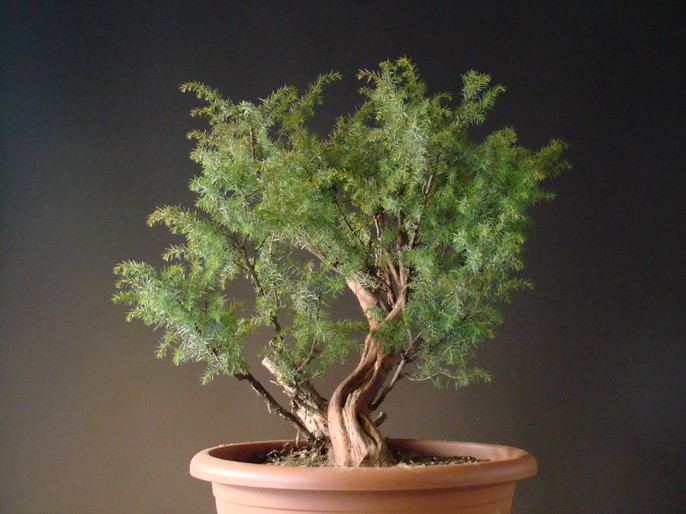
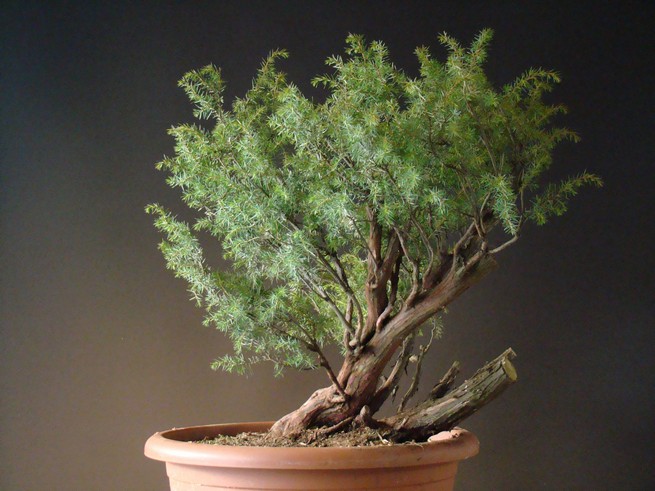
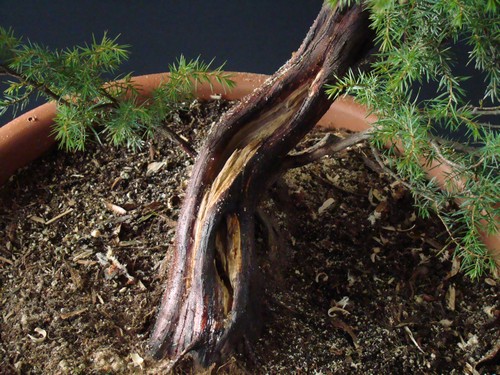
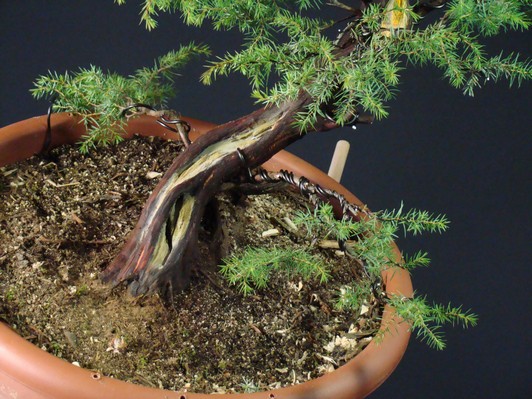

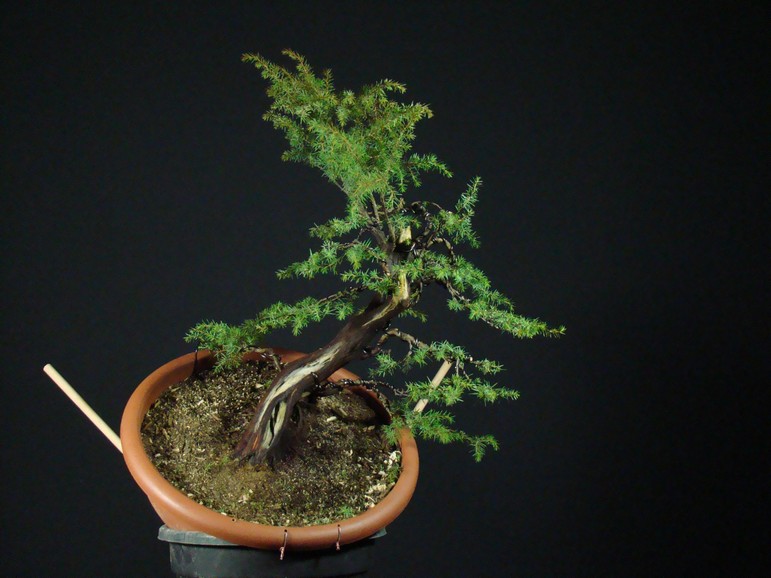
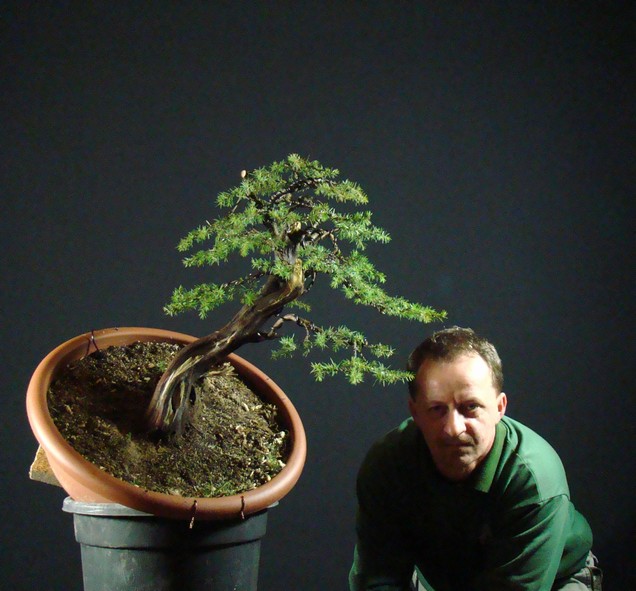
Juniperuus after first styling
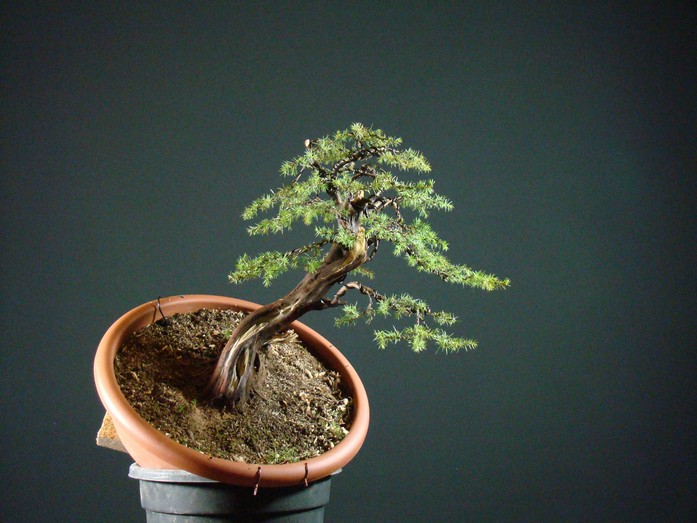
Pavel
more pict.: http://www.bonsaivigi.cz/fotoalbum/tvarovani-a-vyvoj---styling-and-development/juniperus-communis---yamadori-2007-_m_skrabal_
The owner of Juniperus is my friend. Yesterday I tried the first styling of the tree. I think that we have managed to create interesting compositions.
pict. 1 - original yamadori







Juniperuus after first styling

Pavel
more pict.: http://www.bonsaivigi.cz/fotoalbum/tvarovani-a-vyvoj---styling-and-development/juniperus-communis---yamadori-2007-_m_skrabal_
Last edited by Pavel Slovák on Mon Mar 08, 2010 8:26 am; edited 1 time in total

Pavel Slovák- Member
 Re: Juniperus communis - yamadori 2007
Re: Juniperus communis - yamadori 2007
Pavel,
Very nice. The foliage looks a lot finer than the varieties growing wild in Ireland. They are notoriously hard to collect here and like to take a number of years to die slowly. What sort of survival rate do you get? Any tips? :-)
Regards
Ian
Very nice. The foliage looks a lot finer than the varieties growing wild in Ireland. They are notoriously hard to collect here and like to take a number of years to die slowly. What sort of survival rate do you get? Any tips? :-)
Regards
Ian
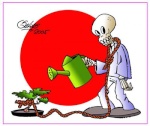
Ian Young- Member
 Re: Juniperus communis - yamadori 2007
Re: Juniperus communis - yamadori 2007
Hi Ian.
There are many varieties of Juniperus communis. Yes, it is difficult to collect Juniperus communis. It is necessary to carefully select the site with healthy trees. With the ability to choose as many roots. The pick-up is necessary to select the correct period in the development tree. For me it meant the beginning of spring sprouting. In the past four years I have collected six trees, Juniperus communis. Are all right.About ten years ago, we gathered all three trees and two years of gradually died as a result of unknown fungal disease. He really wants to collect the trees healthy and must be sought. Not to collect everything and at any time.
Pavel
There are many varieties of Juniperus communis. Yes, it is difficult to collect Juniperus communis. It is necessary to carefully select the site with healthy trees. With the ability to choose as many roots. The pick-up is necessary to select the correct period in the development tree. For me it meant the beginning of spring sprouting. In the past four years I have collected six trees, Juniperus communis. Are all right.About ten years ago, we gathered all three trees and two years of gradually died as a result of unknown fungal disease. He really wants to collect the trees healthy and must be sought. Not to collect everything and at any time.
Pavel

Pavel Slovák- Member
Gorilla likes this post
 Re: Juniperus communis - yamadori 2007
Re: Juniperus communis - yamadori 2007
hello pavel,
great movement in the trunk,and a very nice reflection off the foliage.
must say very nice work.
great movement in the trunk,and a very nice reflection off the foliage.
must say very nice work.

eric sanders- Member
 Re: Juniperus communis - yamadori 2007
Re: Juniperus communis - yamadori 2007
Thanks Pavel. The fungal disease you refer to is a big problem. I read somewhere that 80% of Common Junipers in the wild have it! They seem to cope with it in the wild but not after collection. It has a habit of killing important branches!! I guess wherever you live in the world, common junipers are hard to collect but possibly worth the effort.
Regards
Ian
Regards
Ian

Ian Young- Member
 Re: Juniperus communis - yamadori 2007
Re: Juniperus communis - yamadori 2007
Lovely communis Juniper, Pavel.
This difficulty of collection of this species is a topic that I'm very interested in and one that has surfaced more than once on the IBC before. Many theories have been put forward, but this one is completely new to me. It is nice to know that there could be a logical reason. Now, is there a fungicide that would clear up the problem prior to, or after collection?
This difficulty of collection of this species is a topic that I'm very interested in and one that has surfaced more than once on the IBC before. Many theories have been put forward, but this one is completely new to me. It is nice to know that there could be a logical reason. Now, is there a fungicide that would clear up the problem prior to, or after collection?

Kev Bailey- Admin
 Re: Juniperus communis - yamadori 2007
Re: Juniperus communis - yamadori 2007
Kev,
You can see the signs of the fungal infection on the trunk and branches. It tends to swell the area and has a dappled look to it. Not easy to see at times, but it's there. The fungus usually appears/flowers with gusto in Feb/March time, usually after a heavy shower of rain. Literally overnight the tree sprouts an orange gel type fungus. It can swell a lot and sometimes can split the cambium. I keep meaning to photograph it. I have a few in the garden but the cold snap this year seems to have delayed the fungus flowering this year. I'll have the camera at the ready :-)
I've tried a few treatments but this type of 'rust' seems to survive deep in the wood. 'Bonsai from the Wild' By A.N. Lenz has a brilliant piece about this rust and even though it's American based it sounds identical to our European one. He states that the only way to get rid is to burn the tree!!
Regards
Ian
You can see the signs of the fungal infection on the trunk and branches. It tends to swell the area and has a dappled look to it. Not easy to see at times, but it's there. The fungus usually appears/flowers with gusto in Feb/March time, usually after a heavy shower of rain. Literally overnight the tree sprouts an orange gel type fungus. It can swell a lot and sometimes can split the cambium. I keep meaning to photograph it. I have a few in the garden but the cold snap this year seems to have delayed the fungus flowering this year. I'll have the camera at the ready :-)
I've tried a few treatments but this type of 'rust' seems to survive deep in the wood. 'Bonsai from the Wild' By A.N. Lenz has a brilliant piece about this rust and even though it's American based it sounds identical to our European one. He states that the only way to get rid is to burn the tree!!
Regards
Ian

Ian Young- Member
 Re: Juniperus communis - yamadori 2007
Re: Juniperus communis - yamadori 2007
i have to say that mister lenz is right. gymnosporangium spp that,s the name off the fungus.
you can read a lot on google about it.
the dutch name is perenroest.
good luck
you can read a lot on google about it.
the dutch name is perenroest.
good luck

eric sanders- Member
 Re: Juniperus communis - yamadori 2007
Re: Juniperus communis - yamadori 2007
Just remembered that I took these shots of the fungus on a common juniper last week. The great weather we are having seems to be holding it back this year. No doubt in the next heavy rain shower it will explode! As you can see it runs along he branch as opposed to around it, that said it can overwhelm smaller branches causing their demise.

This one shows how the branch will swell in the infected area.
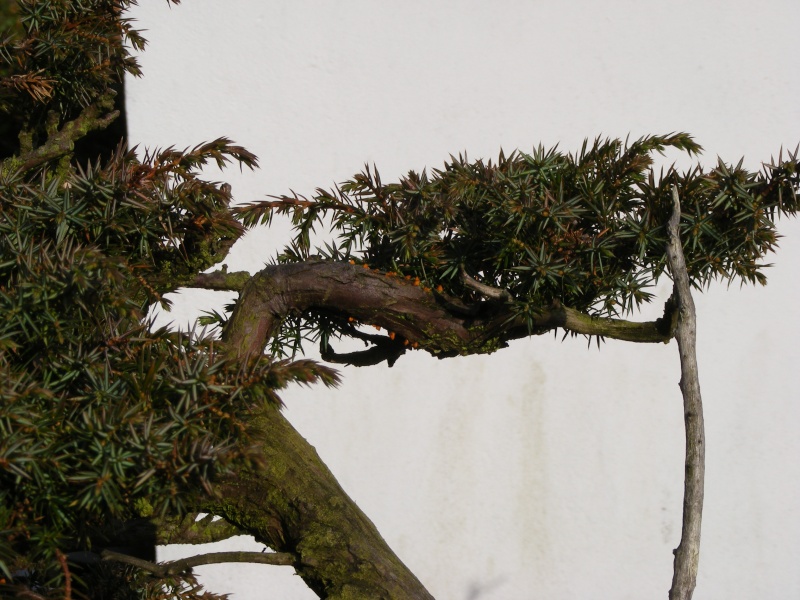

This one shows how the branch will swell in the infected area.


Ian Young- Member
 Re: Juniperus communis - yamadori 2007
Re: Juniperus communis - yamadori 2007
Hi! all.
Lost a few trees and tried a lot,....nothing seems to work!
And i tried a lot,...
Its alway's a pitty to get rid of trees!
grtz m
Lost a few trees and tried a lot,....nothing seems to work!
And i tried a lot,...
Its alway's a pitty to get rid of trees!
grtz m

littleart-fx- Member
 Re: Juniperus communis - yamadori 2007
Re: Juniperus communis - yamadori 2007
The rust Mr. Lenz refers to is Cedar Apple Rust. It is quite prevalent here in the eastern US. It is a rust that requires 2 types of trees to complete its life cycle. The galls (the orange ones) turn into globby gel like flowers after a rain and when they dry again explode sending out their spores. This stage is seen in Junipers which host the galls. The most common ones are Eastern Red cedar(Juniperus Virginiana) and Juniperus Communis although the galls can be found on any type of juniper. The second stage is the rust that forms on the leaves of infected apples, crabapples, quince etc. as a result of the spores. Although a serious infection can weaken a tree, Cedar apple rust is generally not a life threatening condition for either tree. That being said--I'm not running an orchard, in which case I'm sure this fungus would be far more troubling to me!!

Paul Landis- Member
 treatment for this rust?
treatment for this rust?
Is there any treatment for this rust? It seams that you can do a huge amount of work for nothing if you end up getting this problem.
Tony
Tony
Guest- Guest
 Re: Juniperus communis - yamadori 2007
Re: Juniperus communis - yamadori 2007
some more info: http://plantclinic.cornell.edu/FactSheets/cedar-applerust/cedar-applerust.htm
A bonsai nursery near me has stopped stocking Japanese flowering quince for this reason.
A bonsai nursery near me has stopped stocking Japanese flowering quince for this reason.

Tom- Member
 Re: Juniperus communis - yamadori 2007
Re: Juniperus communis - yamadori 2007
Tony--as far as I know a standard regimen of fungicides should take care of it.

Paul Landis- Member
 Re: Juniperus communis - yamadori 2007
Re: Juniperus communis - yamadori 2007
Its's been dry here for a few weeks (hard to believe, I know!!) but today we had a thunder storm and I decided to check on the juniper as this is usually when the fungus expands. As expected it had grown considerably during the storm and will probably expand further over night. I sprayed with a fungicide but this particular type can lie deep in heartwood and prove stubborn to shift. You can compare the shots below with the ones a few weeks ago above.
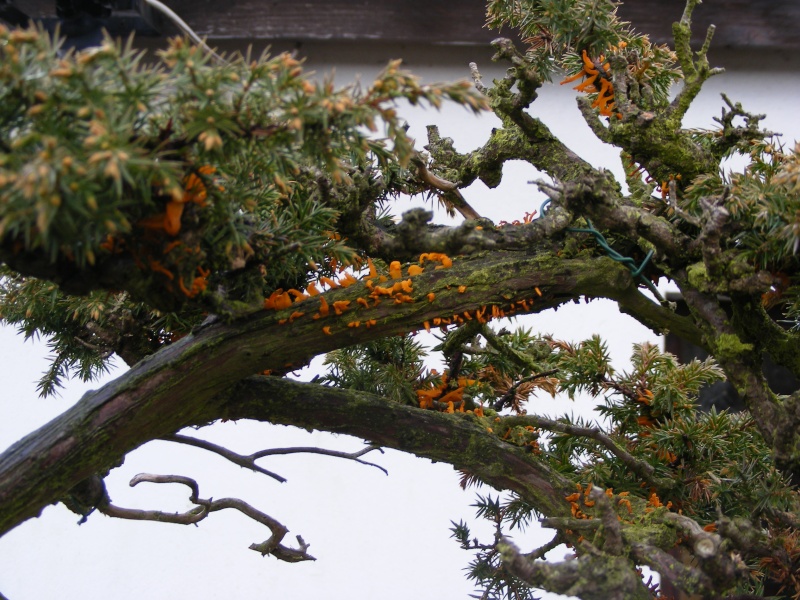
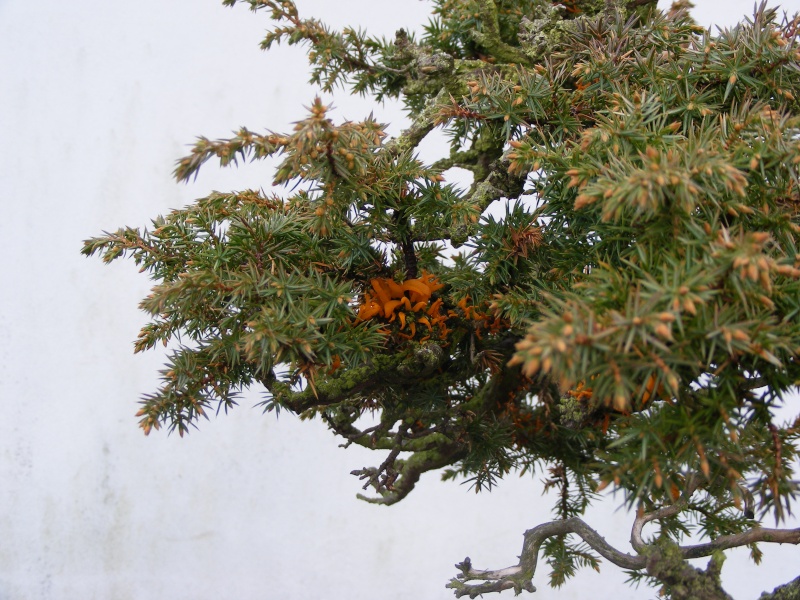
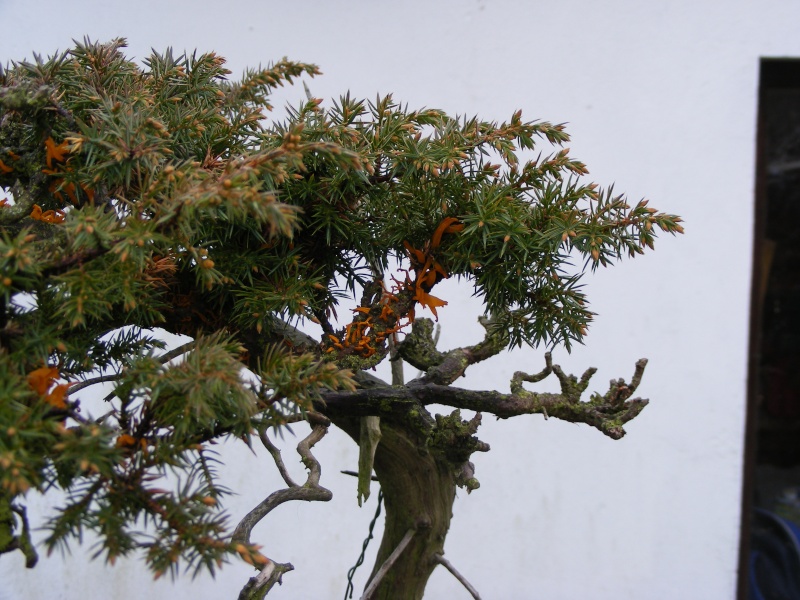




Ian Young- Member
 Re: Juniperus communis - yamadori 2007
Re: Juniperus communis - yamadori 2007
Hello Ian. Very interesting thread and thanks for the information. I take it you or someone collected this tree from the wild? It looks quite healthy and the buds seem quite vigourous. Will this Juniper die in time, or can you control the fungus?
Guest- Guest
 Re: Juniperus communis - yamadori 2007
Re: Juniperus communis - yamadori 2007
Will,
I have collected Common Juniper here over the years. I collected this one about 10 years ago. It grows well except for the fungus issues. I have sprayed it with just about everything on the market! Some years it seems to work and things look great, then out of the blue it's back. I think it survives deep in the heartwood and is therefore always going to be there. It is after all what makes the great deadwood in nature. Some absolute stunning ones where I used to collect. I haven't bothered collecting them for years now, too painful to see them die after maybe 6 or 7 years work. Even if they don't die they will throw branches due to the swelling and bursting of the cambium by the fungus. This is somewhat annoying if its an important branch! You can find some without the fungus but I would say that 80% in the wild have it. I would only every collect one again if it was a stunner and showed no signs of infection. After recent posts on here I'm looking for a decent blackthorn site now :-)
I have collected Common Juniper here over the years. I collected this one about 10 years ago. It grows well except for the fungus issues. I have sprayed it with just about everything on the market! Some years it seems to work and things look great, then out of the blue it's back. I think it survives deep in the heartwood and is therefore always going to be there. It is after all what makes the great deadwood in nature. Some absolute stunning ones where I used to collect. I haven't bothered collecting them for years now, too painful to see them die after maybe 6 or 7 years work. Even if they don't die they will throw branches due to the swelling and bursting of the cambium by the fungus. This is somewhat annoying if its an important branch! You can find some without the fungus but I would say that 80% in the wild have it. I would only every collect one again if it was a stunner and showed no signs of infection. After recent posts on here I'm looking for a decent blackthorn site now :-)

Ian Young- Member
 juniper
juniper
Hi Ian can I make a suggestion,clean and remove all the old and flaky
bark first with a very mild solution of soapy water & toothbrush or similar,
THEN!! give it a dose of fungicide hope this helps,keep us posted on the result.
 Alex e
Alex e
bark first with a very mild solution of soapy water & toothbrush or similar,
THEN!! give it a dose of fungicide hope this helps,keep us posted on the result.
 Alex e
Alex e
alex e- Member
 Re: Juniperus communis - yamadori 2007
Re: Juniperus communis - yamadori 2007
I avoid systemics, both insecticide and fungicide and I know little about them. If you think the fungus lies deep in the heartwood, can you not treat it when the fungus is fruiting and very large and visible? A systemic should get right back to the source?
Guest- Guest
 Re: Juniperus communis - yamadori 2007
Re: Juniperus communis - yamadori 2007
Great transformation Pavel! Interesting info about fungi too Ian!
2 Questions: Are we certain that this fungi is to blame for the poor success rate in collecting this species? The fungi seems evident to effect stems but the trees pictured have healthy foliage as Will suggests, and as the fungi dose'nt seem to grow on the roots can it be to blame?
Secondly, has anyone tryed airlaying communis or indeed any type needle juniper. If they where easily rooted it would be possible to select unaffected stems and produce a set of roots which had not been subjected to the fungi in the environment?
2 Questions: Are we certain that this fungi is to blame for the poor success rate in collecting this species? The fungi seems evident to effect stems but the trees pictured have healthy foliage as Will suggests, and as the fungi dose'nt seem to grow on the roots can it be to blame?
Secondly, has anyone tryed airlaying communis or indeed any type needle juniper. If they where easily rooted it would be possible to select unaffected stems and produce a set of roots which had not been subjected to the fungi in the environment?
Marko- Member
 Re: Juniperus communis - yamadori 2007
Re: Juniperus communis - yamadori 2007
Marko,
I have neglected this tree of late, I use the excuse that I'm allowing it a period of free growth :-) I lost a few branches about 2 years ago and decided to put it out of sight before I did something in a temper lol. It has now rotated back into my to do list and will be tackled in the next few months. A good clean up is long over due.
I personally don't think they are that hard to collect, no more so than blackthorn or Hawthorn. I believe this may vary regionally though. I was getting roughly 70% + success. You just need to progress slowly with them allowing a few years for fine root to develop into a gritty mix before removal of original soil. I don't think the fungi is an issue when collecting or a concern regarding roots. It is a problem for long term branch retention though!!
Will,
I totally agree with you regarding systemics especially the insecticides. I only use them as a last resort. However, I have tried them on Common junipers. Nothing ventured, nothing gained!! I treated this one last night after the heavy rain, lifting it into the the garage to stop further rain washing it off. This is why I've been keeping a close eye on it this season waiting for this very moment to strike. I'll keep you all posted on any success or failure.
I have neglected this tree of late, I use the excuse that I'm allowing it a period of free growth :-) I lost a few branches about 2 years ago and decided to put it out of sight before I did something in a temper lol. It has now rotated back into my to do list and will be tackled in the next few months. A good clean up is long over due.
I personally don't think they are that hard to collect, no more so than blackthorn or Hawthorn. I believe this may vary regionally though. I was getting roughly 70% + success. You just need to progress slowly with them allowing a few years for fine root to develop into a gritty mix before removal of original soil. I don't think the fungi is an issue when collecting or a concern regarding roots. It is a problem for long term branch retention though!!
Will,
I totally agree with you regarding systemics especially the insecticides. I only use them as a last resort. However, I have tried them on Common junipers. Nothing ventured, nothing gained!! I treated this one last night after the heavy rain, lifting it into the the garage to stop further rain washing it off. This is why I've been keeping a close eye on it this season waiting for this very moment to strike. I'll keep you all posted on any success or failure.

Ian Young- Member
 Rust on Common Junipers
Rust on Common Junipers
I collected several common junipers which developed the dreaded orange "jelly babies" very quickly once humidity built up. They were treated by wire brushing the growths off whenever they appeared, combined with a fungicidal spray given very three weeks or so. Copper based fungicide was one I used. The fungus tried to come back a couple of times but the treatment seemed to cure it after a month or so.
Horticulturally, the common juiper as bonsai is a challenge if you give it too much "bonsai" technique at any one time. It resents invasive moisture reductions so not too much bark stripping; keep pots deepish; avoid copper wire right to the branch tips; leave generous amounts of foliage.
Regards,
Peter Adams
Horticulturally, the common juiper as bonsai is a challenge if you give it too much "bonsai" technique at any one time. It resents invasive moisture reductions so not too much bark stripping; keep pots deepish; avoid copper wire right to the branch tips; leave generous amounts of foliage.
Regards,
Peter Adams
Peter Adams- Member
 Similar topics
Similar topics» Juniperus communis II.- yamadori
» Juniperus Communis yamadori
» Juniperus Communis, shohin
» Juniperus sabina - yamadori 2007
» Juniperus communis shohin
» Juniperus Communis yamadori
» Juniperus Communis, shohin
» Juniperus sabina - yamadori 2007
» Juniperus communis shohin
Page 1 of 1
Permissions in this forum:
You cannot reply to topics in this forum






